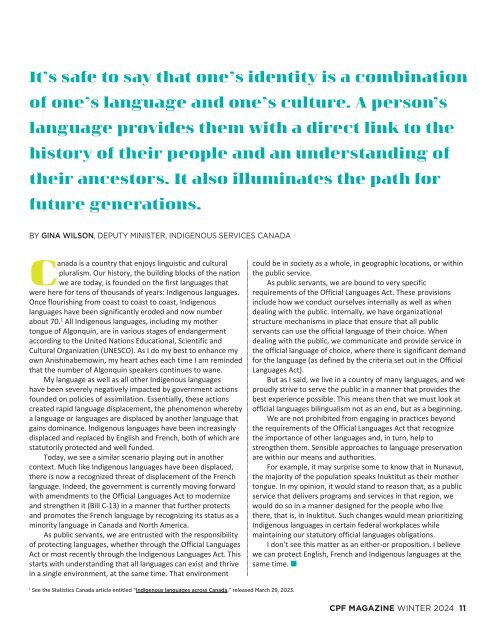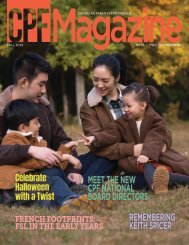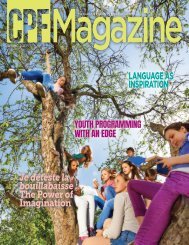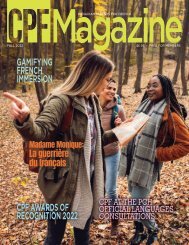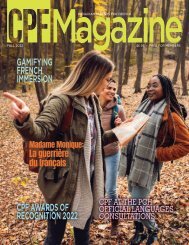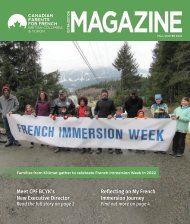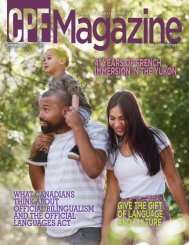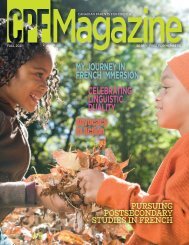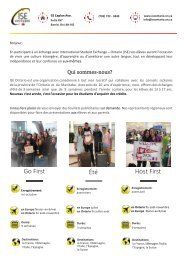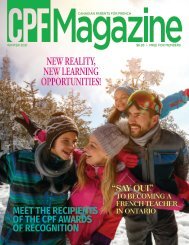CPF Magazine Winter 2024 Issue
A national network of volunteers, parents and stakeholders who value French as an integral part of Canada. CPF Magazine is dedicated to the promotion and creation of French-second-language learning opportunities for young Canadians.
A national network of volunteers, parents and stakeholders who value French as an integral part of Canada. CPF Magazine is dedicated to the promotion and creation of French-second-language learning opportunities for young Canadians.
Create successful ePaper yourself
Turn your PDF publications into a flip-book with our unique Google optimized e-Paper software.
It’s safe to say that one’s identity is a combination<br />
of one’s language and one’s culture. A person’s<br />
language provides them with a direct link to the<br />
history of their people and an understanding of<br />
their ancestors. It also illuminates the path for<br />
future generations.<br />
BY GINA WILSON, DEPUTY MINISTER, INDIGENOUS SERVICES CANADA<br />
Canada is a country that enjoys linguistic and cultural<br />
pluralism. Our history, the building blocks of the nation<br />
we are today, is founded on the first languages that<br />
were here for tens of thousands of years: Indigenous languages.<br />
Once flourishing from coast to coast to coast, Indigenous<br />
languages have been significantly eroded and now number<br />
about 70. 1 All Indigenous languages, including my mother<br />
tongue of Algonquin, are in various stages of endangerment<br />
according to the United Nations Educational, Scientific and<br />
Cultural Organization (UNESCO). As I do my best to enhance my<br />
own Anishinabemowin, my heart aches each time I am reminded<br />
that the number of Algonquin speakers continues to wane.<br />
My language as well as all other Indigenous languages<br />
have been severely negatively impacted by government actions<br />
founded on policies of assimilation. Essentially, these actions<br />
created rapid language displacement, the phenomenon whereby<br />
a language or languages are displaced by another language that<br />
gains dominance. Indigenous languages have been increasingly<br />
displaced and replaced by English and French, both of which are<br />
statutorily protected and well funded.<br />
Today, we see a similar scenario playing out in another<br />
context. Much like Indigenous languages have been displaced,<br />
there is now a recognized threat of displacement of the French<br />
language. Indeed, the government is currently moving forward<br />
with amendments to the Official Languages Act to modernize<br />
and strengthen it (Bill C-13) in a manner that further protects<br />
and promotes the French language by recognizing its status as a<br />
minority language in Canada and North America.<br />
As public servants, we are entrusted with the responsibility<br />
of protecting languages, whether through the Official Languages<br />
Act or most recently through the Indigenous Languages Act. This<br />
starts with understanding that all languages can exist and thrive<br />
in a single environment, at the same time. That environment<br />
could be in society as a whole, in geographic locations, or within<br />
the public service.<br />
As public servants, we are bound to very specific<br />
requirements of the Official Languages Act. These provisions<br />
include how we conduct ourselves internally as well as when<br />
dealing with the public. Internally, we have organizational<br />
structure mechanisms in place that ensure that all public<br />
servants can use the official language of their choice. When<br />
dealing with the public, we communicate and provide service in<br />
the official language of choice, where there is significant demand<br />
for the language (as defined by the criteria set out in the Official<br />
Languages Act).<br />
But as I said, we live in a country of many languages, and we<br />
proudly strive to serve the public in a manner that provides the<br />
best experience possible. This means then that we must look at<br />
official languages bilingualism not as an end, but as a beginning.<br />
We are not prohibited from engaging in practices beyond<br />
the requirements of the Official Languages Act that recognize<br />
the importance of other languages and, in turn, help to<br />
strengthen them. Sensible approaches to language preservation<br />
are within our means and authorities.<br />
For example, it may surprise some to know that in Nunavut,<br />
the majority of the population speaks Inuktitut as their mother<br />
tongue. In my opinion, it would stand to reason that, as a public<br />
service that delivers programs and services in that region, we<br />
would do so in a manner designed for the people who live<br />
there, that is, in Inuktitut. Such changes would mean prioritizing<br />
Indigenous languages in certain federal workplaces while<br />
maintaining our statutory official languages obligations.<br />
I don’t see this matter as an either-or proposition. I believe<br />
we can protect English, French and Indigenous languages at the<br />
same time. n<br />
1<br />
See the Statistics Canada article entitled “Indigenous languages across Canada,” released March 29, 2023.<br />
<strong>CPF</strong> MAGAZINE WINTER <strong>2024</strong> 11


